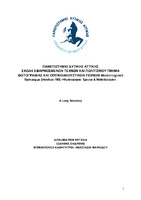| dc.contributor.advisor | Μαρκίδου, Αναστασία | |
| dc.contributor.author | Ζινδριλής, Ιωάννης | |
| dc.date.accessioned | 2024-04-04T10:38:23Z | |
| dc.date.available | 2024-04-04T10:38:23Z | |
| dc.date.issued | 2024-03-02 | |
| dc.identifier.uri | https://polynoe.lib.uniwa.gr/xmlui/handle/11400/6375 | |
| dc.identifier.uri | http://dx.doi.org/10.26265/polynoe-6211 | |
| dc.description.abstract | Ο Γαλλοαμερικανός δοκιμιογράφος και κριτικός λογοτεχνίας George Steiner (1929-2020), δανείζεται από την Καινή Διαθήκη το σχήμα Παρασκευή, Σάββατο, Κυριακή και διατυπώνει το αφήγημα για το «Μακρύ Σάββατο», σχόλιο για την εποχή που διανύουμε. Ο Steiner εντοπίζει έναν ενδιάμεσο μεταβατικό χώρο, ο οποίος περιέχει τη γνώση της προηγούμενης καταστροφής και την προσδοκία της επόμενης μέρας. Η συνθήκη του Σαββάτου χαρακτηρίζεται από την απουσία αφηγήσεων, καθώς κυριαρχεί η αβεβαιότητα, η ακινησία και η αμηχανία. Κατά τον συγγραφέα, τα χαρακτηριστικά αυτά έχουν μεγάλη διάρκεια, γι΄ αυτό και της αποδίδει τον χαρακτηρισμό «Μακρύ Σάββατο».
Μέσα στο «Μακρύ Σάββατο», οι άνθρωποι περιπλανώνται επαναπροσδιορίζοντας τις αξίες τους. Με αυτόν τον τρόπο χάνουν τις διαμορφωμένες ταυτότητές τους και αναζητούν νέες. Ο Steiner κλείνει το αφήγημα, αποδίδοντας στην Κυριακή ουτοπικό περιεχόμενο, καθώς θα διαμορφωθεί από το νέο ανθρωπολογικό μοντέλο που κυοφορείται.
Στα σκηνοθετημένα πορτρέτα της σειράς, τα άτομα που επιλέχθηκαν, επιτελούν ξεχωριστές ανθρωπολογικές ταυτότητες. Εμφανίζονται με αμηχανία και αβεβαιότητα, χαρακτηριστικά που περιγράφουν την ατμόσφαιρα του Σαββάτου. Το ανθρωπολογικό μοντέλο που προτείνεται στη σειρά φωτογραφιών, αφορά έναν μετέωρο πλάνητα στον περιαστικό χώρο, ο οποίος συγκροτείται μέσω της θέασης και της μη διαμορφωμένης ταυτότητας.
Τα τοπία που επιλέχθηκαν, αναζητήθηκαν στον περιαστικό χώρο, καθώς η μη στοχευμένη ανθρώπινη παρέμβαση τα καθιστά μεταβατικά. Επιπλέον, ικανοποιούν τη συνθήκη του «μη τόπου», αφού η παροδικότητα που τα χαρακτηρίζει ταυτίζεται εννοιολογικά με τον ενδιάμεσο χώρο του «Σαββάτου».
Τέλος, οι χαρακτήρες που εμφανίζονται στη φωτογραφική σειρά, είναι άνθρωποι που μέσω της επιτελεστικής πρακτικής, παρουσιάζουν την ταυτότητά τους αλλά και τη σχέση που αναπτύσσουν με το περιβάλλον στο οποίο βρίσκονται.
Το “A Long Saturday” τοποθετείται στο φωτογραφικό είδος του καλλιτεχνικού ντοκουμέντου, τα χαρακτηριστικά του οποίου αναλύονται στο κείμενο. | el |
| dc.format.extent | 72 | el |
| dc.language.iso | el | el |
| dc.publisher | Πανεπιστήμιο Δυτικής Αττικής | el |
| dc.rights | Αναφορά Δημιουργού - Μη Εμπορική Χρήση - Παρόμοια Διανομή 4.0 Διεθνές | * |
| dc.rights.uri | https://creativecommons.org/licenses/by-nc-sa/4.0/deed.el | * |
| dc.subject | A Long Saturday | el |
| dc.subject | George Steiner | el |
| dc.subject | Καλλιτεχνικό Ντοκουμέντο | el |
| dc.subject | Σκηνοθετημένη Φωτογραφία | el |
| dc.subject | Πορτρέτο | el |
| dc.subject | Τοπιογραφία | el |
| dc.subject | Μεταβατικό Τοπίο | el |
| dc.subject | Μη Τόπος | el |
| dc.title | A Long Saturday | el |
| dc.title.alternative | Ένα Μακρύ Σάββατο | el |
| dc.type | Μεταπτυχιακή διπλωματική εργασία | el |
| dc.contributor.committee | Λαζαρίδης, Σάββας | |
| dc.contributor.committee | Μπάρδη, Αντωνία | |
| dc.contributor.faculty | Σχολή Εφαρμοσμένων Τεχνών & Πολιτισμού | el |
| dc.contributor.department | Τμήμα Φωτογραφίας και Οπτικοακουστικών Τεχνών | el |
| dc.contributor.master | Φωτογραφία: Έρευνα και Μεθοδολογία | el |
| dc.description.abstracttranslated | The esteemed Franco-American essayist and critic of literature, George Steiner (1929-2020), appropriates the New Testament’s structure of Friday, Saturday, and Sunday to construct a theoretical framework for the “Long Saturday”. This concept serves as an allegory for the contemporary era we traverse. Steiner identifies an intermediary, transitional domain that emerges from the ruins of destruction, pregnant with the expectation of a new dawn. The interlude of Saturday is defined by an absence of narrative, where uncertainty, inertia, and perplexity are the prevailing conditions. Steiner contends that these traits are protracted, thus coining the term “A Long Saturday”.
Within this temporal interstice, individuals embark on a journey of introspection, re-evaluating their core values. This process leads to the dissolution of their pre-existing identities and the quest for new ones. Steiner concludes his treatise by endowing Sunday with a utopian potential, predicated on the emergent anthropological archetype that is in the throes of formation.
The series of meticulously composed portraits showcase individuals embodying unique anthropological identities. They are portrayed with a sense of disorientation and uncertainty, mirroring the quintessence of Saturday. The anthropological archetype proposed in this photographic collection portrays a motionless planet situated in the suburban expanse, shaped through the act of observation and the fluidity of identity.
The chosen landscapes, nestled within the suburban sprawl, are characterized by their transitory nature, a consequence of minimal human intervention. They also epitomize the concept of the “non-place,” resonating conceptually with the liminal “Saturday” space.
In conclusion, the personas depicted in the photographic series, through their performative expressions, articulate their identities and the dynamic interplay with their immediate environments. The series, titled “A Long Saturday”, is positioned within the realm of artistic documentary photography, with its salient attributes expounded upon in the narrative. | el |


